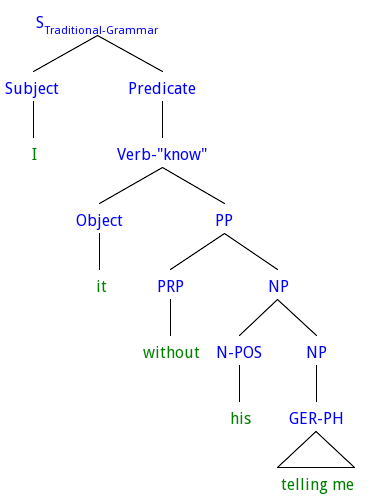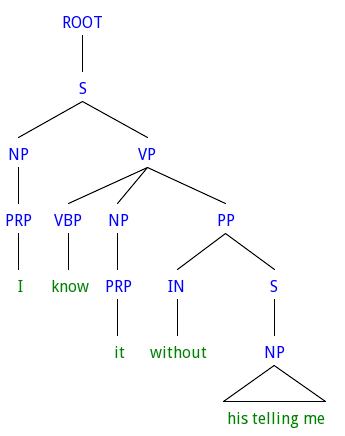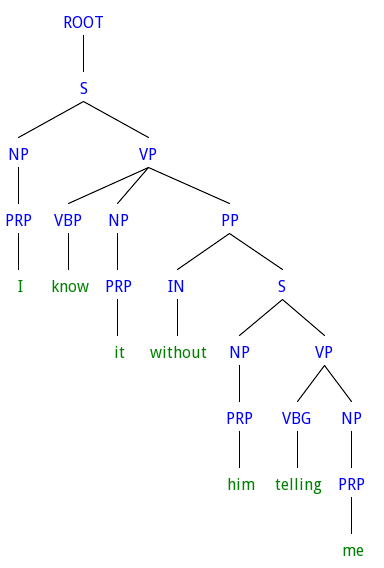NOTE ADDED TO ANSWER
The OP clarified that he/she wanted to know the semantic difference between these two phrases. I will maintain that, for the general reader, both sentences are generally considered acceptable, and the semantics are identical for practically all purposes. There are some subtle variations in style or meaning in which one form might be better than another.
My position is supported by an absolutely outstanding work, with an unassuming name, General properties of Gerunds, Participles and Verbal Nouns (PDF). Based on this work, the phrase "his telling me" seems to be more traditionally (perhaps prescriptively) correct. Also, "him telling me" has more of a feel of an independent clause (aka IP), "subject verb object", while "his telling me" is more like a dependent clause (aka DP). The author also indicates there is ambiguity in how to parse these. Don't hesitate to search the General properties of Gerunds, Participles and Verbal Nouns for semantics to find additional relevant information.
I want to highlight this work (and the author) and encourage an interested linguistics reader to investigate further. It's a very interesting (advanced yet sometimes very readable) exposition on many facets of this complex issue, including this exact issue of semantics. The above chapter seems to contain (directly or indirectly via reference) the best research on the theory to this question through the publication date.
For reference, the above text is part of a book (also with an unassuming name), Complementation in English: A Minimalist Approach (Cornilescu 2003, Google Ref) I must say Alexandra Cornilescu has many outstanding and intriguing papers/books that I'll be reading. Here's the Wikipedia Page (translated) about him.
General searches to find these works, see:
I haven't the time to dig further into this at this point. Anyone else is free to use the source I've provided to create/enhance their own answer.
The following is my entire answer before the above note was created, and I still stand by it's value.
Preface
For the grammar involved, this question has a very good answer in https://english.stackexchange.com/a/2628/61171 (Credit @CopperKettle for reference.) I'll attempt to convey my native AmEng intuition with examples so we can avoid some of the heavier grammar lingo.
Second, let's simplify by giving him a name, "John". Now we can talk about John directly. This is simply a teaching aid.
Semantics
In isolation, there's no significant semantic difference between the two sentences. They are saying exactly the same thing in slightly different ways.
But in some contexts, the differences could have some differing semantic pull. The issue of semantic differences might be rephrased: If you polled 100 people, what meanings would be interpreted, and what would be the percentage of each meaning?
Grammar Basics
Let's review some basic grammar.
Now consider some gerunds in which their function is more clear than the OP's sentences:
- I saw John dancing.
- I saw him dancing. (I saw him doing something. This conveys a sense of action.)
- John's dancing is beautiful.
- His dancing is beautiful. ("His dancing" is the subject. I'm talking about his act of dancing, as if it were a static thing.)
Note in the last example, "His dancing" is the subject of the sentence and functions like a noun.
FIRST SENTENCE
For the first sentence, his is a possessive pronoun, and "his telling me" functions as a noun. The following sentences all have a similar feel to them (relative to the "him" sentence):
- I know it without his telling me.
- I know it without John's act of telling me.
- I know it without John's advice.
- I know it without advice.
Here's a tree showing a traditional grammar layout of the sentence:1

Here's a more modern syntax tree:2

SECOND SENTENCE
In the second sentence, the word "him" is the same as "John". Note the following:
- John told Paul a secret.
- He told him a secret.
Now consider the following:
- It's funny to see John dancing.
"John dancing" has an active meaning. John is hypothetically doing something. Here's a modern syntax tree:3

Footnotes on Syntax Trees
This section demonstrates how to easily create the images contained within this answer. As such, this section is only ancillary technical information and is separate from the answer proper.
Below, I show how to generate Labeled Bracket Notation and how to render that notation into an image of a tree.
For the modern grammar syntax trees, I went to the the Stanford Parser and entered the first sentence. I substituted [ for ( and ] for ) and plugged that into http://yohasebe.com/rsyntaxtree. That gave a pretty picture. I usually resize these in something like pixlr to make them smaller. These trees use artificial intelligence natural language processing (NLP), and as such, may give less-than-ideal or incorrect results.
1. Sentence 1 - Traditional Grammar
The first sentence I changed to typify a traditional grammar.
[S_Traditional-Grammar
[Subject I]
[Predicate
[Verb-"know"
[Object it]
[PP
[PRP without]
[NP
[N-POS his]
[NP
[GER-PH^ telling me]
]
]
]
]
]
]
2. Sentence 1 - Modern Syntax Tree
The Stanford Parser results for the modern syntax tree didn't express what I wanted, so I modified it slightly.
[S
[NP [PRP I]]
[VP [VBP know]
[NP [PRP it]]
[PP [IN without]
[NP his telling me]
]
]
]
3. Sentence 2 - Modern Syntax Tree
For the second sentence, I liked the Stanford Parser result. It's still slightly simplified.
[ROOT
[S
[NP [PRP I]]
[VP [VBP know]
[NP [PRP it]]
[PP [IN without]
[S
[NP [PRP him]]
[VP [VBG telling]
[NP [PRP me]]]]]]
]]



